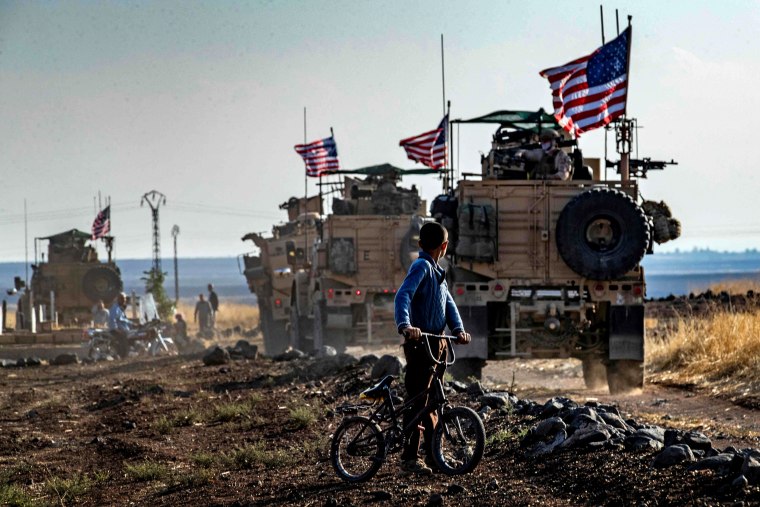Two former senior U.S. officials who helped lead the fight against the Islamic State terror group have condemned President Donald Trump’s decision to withdraw American military support for Kurdish fighters in northern Syria.
The interviews — featured in MSNBC’s On Assignment with Richard Engel — suggest a deep sense of unease among those close to the campaign with the way the U.S. has treated a loyal ally, and the devastating impact the decision has had on the Kurdish people.
Brett McGurk, who ran the counter-ISIS strategy under Trump and former President Barack Obama, said he was shocked by evidence he’d seen of “war crimes” and “terrible acts of barbarity” following Turkey’s invasion of Kurdish-held areas.
The U.S. decision to withdraw troops from the area and clear the way for the Turkish advance had resulted in a “complete unraveling of the entire tapestry of northeast Syria,” he said.
As a result of the Turkish invasion, it's estimated that hundreds of thousands of people have been displaced from their homes, leading to accusations of ethnic cleansing.
“Definitely the United States bears some responsibility” for that, McGurk said.
Gen. Joseph Votel, former commander of U.S. Central Command, expressed his concern that America’s ability to operate effectively in the region was now “diminished” and said he feared that it will be “Russia, Turkey and perhaps Iran” who will be calling the shots from now on.
For more on this story: The next episode of On Assignment with Richard Engel airs on MSNBC at 10 p.m. ET on Sunday Nov. 17th.
Both men were at the forefront of the U.S. mission to eradicate ISIS from the territory it had seized in Syria and Iraq. In Syria, that strategy focused on U.S. special forces allying with a Kurdish militia that became known as the Syrian Democratic Forces (SDF).
While the U.S. provided critical military assistance, training and air support, the SDF’s fighters led the brutal ground war against the terror group. They suffered devastating losses during years of fighting, before finally declaring territorial victory over ISIS in March.
McGurk held his position until December 2018, when he resigned in response to what he called Trump's “reckless” declaration that he intended to bring U.S. troops home. McGurk had argued that the region required stability to ensure ISIS couldn’t return.
The SDF were “absolutely essential to our success in Syria,” Gen. Votel said.
In the void left behind by the war, the Kurds started to run their own affairs in the region, establishing what they described as a democratic, self-governing society called Rojava.
Turkey feared the presence of an autonomous Kurdish region on its southern border could embolden its own significant Kurdish minority.
They claimed the SDF were effectively an offshoot of the PKK, a Kurdish militia designated as a terror group by the U.S. who have fought a decadeslong insurgency against the Turkish state.
The presence of U.S. troops was thus “the only thing" preventing Turkey “from coming across the border,” Gen. Votel claimed.
But in October, following a phone call with Turkey’s President Recep Tayyip Erdogan, Trump announced that he was abruptly withdrawing U.S. troops from the region.
America “never agreed to protect the Kurds,” he said in October. “We’ve done them a great service...and now we’re getting out.”
It was a “complete 180 degree reversal,'' according to McGurk, who said he felt Trump had “clearly” given Erdogan the “green light” for the invasion.
“It doesn’t seem very honorable to step away from your partners,” said Gen. Votel who retired following the victory over ISIS earlier this year after three years as commander of U.S. Central Command and almost 40 years of service.
As U.S. troops pulled out of Kurdish areas they were pelted with potatoes and had insults hurled at them by people who felt betrayed.
Gen. Votel said he thought the American soldiers who fought side by side with the Kurds were “as disappointed” as he was by the president’s decision.
Following fierce criticism from both Democratic and Republican lawmakers, Trump did appear to partially backtrack. He announced that some U.S. troops would in fact remain in Syria, but not to protect the Kurds.
“We did leave soldiers because we’re keeping the oil,” he said. “I like oil. We’re keeping the oil.”
But this decision, combined with mixed messages from the White House and Pentagon, resulted in the mission becoming “very unclear,” said McGurk.
“Our legal basis for being in Syria is ISIS, not to protect oil,” he told NBC News.
Trump tweeted last month urging the Kurds to “start heading to the oil region” if they wanted U.S. protection, seemingly referring to a desert area where Kurdish people have never lived.
That was an “incredible thing for an American president to say,” said McGurk, who argued that it showed the president had “no idea about the history, about the terrain... about anything really going on, on the ground,” he argued.
Gen. Votel said he fears the consequences could also be severe for the effectiveness of future U.S. military campaigns.
He said he fears the U.S. military will struggle to “identify partners in future” to advance American interests.
“I think it's going to cause our partners...to question our motives,” he said.

